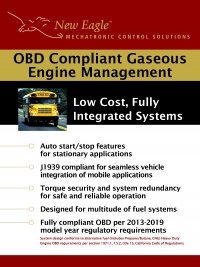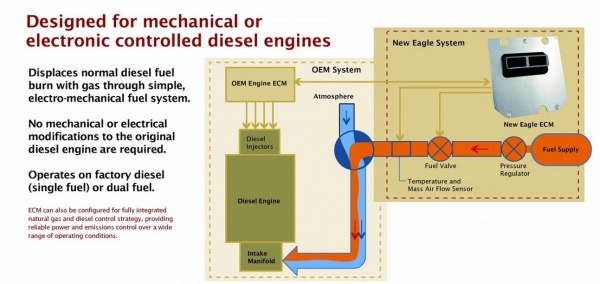Gaseous Fuel Controls
Overview
New Eagle engineers offer system engineering and custom embedded control systems solutions including system designs, development, and integration tools and processes. Services that are provided by New Eagle include controls, production software testing, component and hardware selection and development, user interface devices, and long term customer support.
LPG Engine Control

New Eagle has experience developing gaseous engine systems for both stationary and over the road applications. New Eagle uses it's library of engine controls, it's production qualified engine control hardware and the MotoHawk code generation platform to develop gaseous engine control solutions for our customers.
Features of these systems include:
- Automotive quality and prices for components including sensors, throttles, and engine controllers
- Enhanced user interface for engine control and system installation and setup
- Auto Start / Stop features for scheduled duty cycle or remote engine and load control
- Fuel efficiency advantages by utilizing automotive style torque control algorithms
- OBD diagnostics to protect engine and other system components
- Adaptive to multiple fuel usage
- Adaptable controls for mobile and stationary applications
- Experience with vapor lock handling and purge routines
For detailed information on our gaseous engine projects, please refer to our gaseous engine case studies at OBD Compliant LPG Engine Conversion or Natural Gas Engine with Variable Energy Adjustment.
Dual-Fuel Diesel Engine Controls

New Eagle engineers have worked to help customers build Dual-fuel (diesel / cng) control systems to reduce the fuel cost of stationary and mobile applications, both certified and non-certified. The MotoHawk tool chain is an ideal product for such an application.
- Allow existing diesel engines to safely substitute natural gas ranging from 65% to 80%
- Mileage dramatically increases due to burn rate and efficiency of diesel combustion
- Market payback: occurs within months, depending upon price of fuel
- Seamless integration with existing vehicle systems via CAN:
- Transmission
- Chassis
- Body
- Instrument Clusters